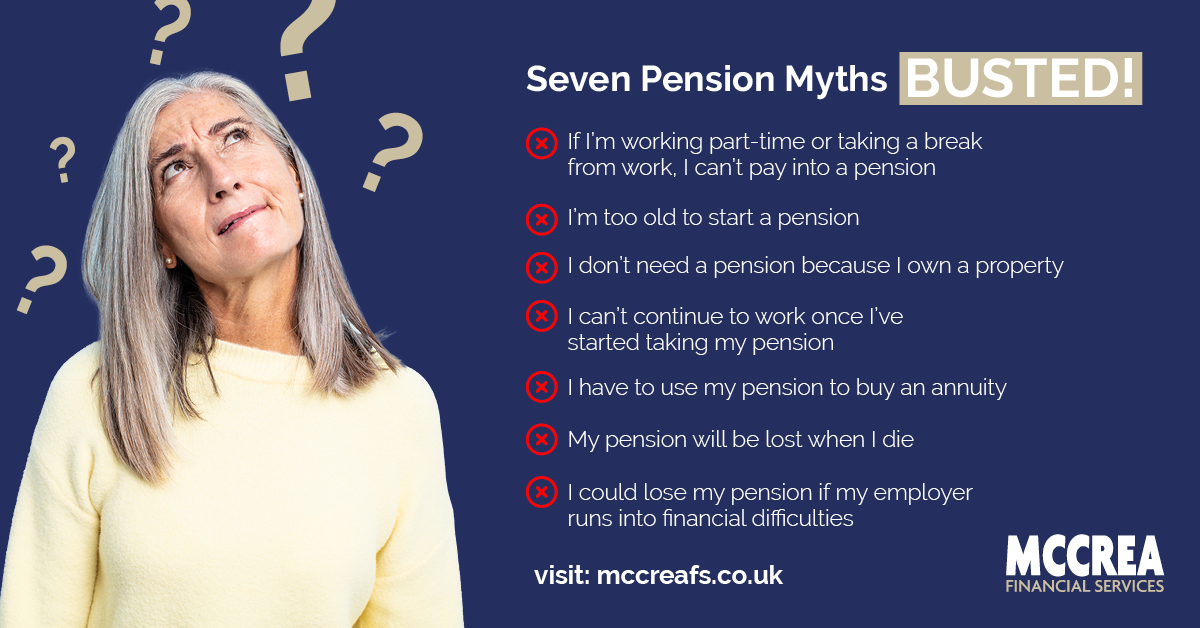Pensions: Busting Seven Myths That Can Stop You From Saving
As the Best Pension Income Planning Specialists in Scotland – 2022, it’s no surprise that here at McCrea, we’re firm believers in maximising your potential pension benefits. That’s why we were pleased to see Melanie Wright bust seven problematic pension myths over at Restless, a site offering finance, lifestyle and careers guidance.
Melanie’s article tackled seven of the most common myths that can prevent people making adequate pension savings:

- “If I’m Working Part-Time or Taking a Break From Work, I Can’t Pay Into a Pension”
As Melanie explains, pension savings are open to everyone. If you’re over the age of 21 and working full or part-time in any one role in which you earn over £10,000, you’ll be automatically enrolled into your employer’s pension scheme, where both you and the organisation you work for will contribute funds towards your retirement. If you’re over the age of 21 and earn less than £10,000 from a single employer, you can ask to opt-in to their pension scheme and benefit from employer contributions to your retirement fund.
If you’re aged 21 or younger, saving for retirement is a great habit to start as you enter working life. Although you won’t be automatically enrolled in your workplace pension, if you earn £6,240 or more each year from one job then you have a right to opt-in to the scheme and receive the minimum level of employer contributions on top of the contributions from your own pay. If you earn less than £6,240 annually, your employer is still obliged to arrange for you to join the pension scheme if you request to, but doesn’t have to make any financial contributions.
Whatever your age or income level, even if you have no income from employment, you can contribute to a personal or private pension.
- “I’m Too Old To Start a Pension”


It's never too late to pay attention to your pension. While some of the tax advantages on money you save into your pension stop after the age of 75, the tax relief available means that making pension contributions is an efficient method of retirement saving throughout our 50s and 60s, even if we’re starting later in life.
- “I Don’t Need a Pension Because I Own a Property”
While house prices have risen dramatically over recent years, Melanie cautions against assuming the market will be buoyant at the exact time you want or need to retire. Not only is the housing market a riskier investment than traditional pensions, but there are hidden costs to consider such as the legal and moving fees, stamp duty and unpredictable purchase price of a new home if you do decide to cash in and downsize - to say nothing of the practical and emotional implications of bidding farewell to your family home.
- ‘I Can’t Continue To Work Once I’ve Started Taking My Pension’
Current pension rules allow access private or personal defined contribution pensions from age 55, rising to 57 by 2028, and allow you to do as you wish with your lifetime savings. Up to 25% of your pension can be taken as a tax-free lump sum, with additional withdrawals taxed as income. You can continue to work as long as you like, and have the opportunity to reduce your working hours if you wish.
If you have a defined benefit or final salary pension, the regulations differ, with most schemes having a retirement age of 60 or 65. Usually, you can't receive income from your pension until then. However, in some cases you may be able to access your pension from the age of 55, although this may result in a lower income during retirement.
While working, you are also able to receive your State Pension. The current State Pension age is 66, however is set to increase to 67 by 2028, creating a gap of approximately 10 years between the age you can access funds from a workplace or private pension, and the State Pension age. You also have the option to defer your State Pension if you don’t need the income yet, and can receive a larger amount at a later stage.
- ‘’I Have To Use My Pension To Buy An Annuity When I Retire’’
Prior to the introduction of pension freedom regulations in 2015, individuals with defined contribution pensions typically utilized their pension savings to purchase an annuity, which provides a lifelong income upon retirement. An annuity represents a contractual agreement with an insurance company where, in exchange for transferring some or all of your pension savings, you receive a guaranteed income. The amount of income received is determined by various factors like age and health.
While annuities continue to be popular among many individuals, pension freedoms have opened up the possibility of drawdown, also referred to as flexible drawdown or flexi-access drawdown, for those seeking greater flexibility. Drawdown allows you to withdraw income from your pension as needed, offering increased control.
This flexibility enables you, for instance, to withdraw a limited amount during years when you have alternative sources of income, such as part-time employment. In the event that your part-time work concludes, you can then choose to increase the amount withdrawn from your pension.
- “My Pension Will Be Lost When I Die”
Details vary between schemes, but far from being inaccessible should the worst happen, pensions can actually be surprisingly tax-efficient methods for leaving a legacy for your loved ones. Whether you’re still employed or have begun to draw on your savings, you can make arrangements for your dependents to receive your pension after you’ve gone.
- “I Could Lose My Pension If My Employer Runs Into Financial Difficulties”

Money you have saved into your pension is protected and your employer is not allowed to use the pension fund to cover funding shortfalls elsewhere in the business.
If you are a member of a defined contribution pension, which pays out depending on how much you’ve saved and how the fund’s investments have performed, you’ll still receive your pension from the provider who runs your scheme, not your employer, even if your employer goes bust. Your payments may be reduced if your pension is a trust-based scheme, to account for running costs which can no longer be met by your employer.
Members of defined benefit (or ‘final salary’) pensions, which guarantee a fixed income in retirement, are protected by the Pension Protection Fund if their employer finds themselves unable to pay the required pensions. The fund typically pays 100% of the pension entitlement to those who have already reached retirement age, and 90% to those below the retirement age stated in the scheme.
Here at McCrea, our award-winning independent pensions specialists are here to help guide you through the process of retirement planning. We can help you plan the most tax advantageous way to access your savings and leave a legacy to your loved ones, check the small print on your products and entitlements and make sure you have access to the pensions best suited to your unique retirement plans. We can even help you track down pensions you’ve lost track of during the course of your career. Why not get in touch today for a free no-obligation chat?
